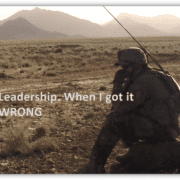This is the first in a four-part series about the role values, beliefs, attitudes and behavior in leadership.
Your values are your individual principles motivating your sense of right and wrong. They serve as your guide for judging behavior, whether your own or those you interact with. The starting point for what your values are is what you were raised with, plus the influence of your role models, especially during your childhood. Culture also plays a role in both defining your values and shifting them over time. Here’s how to clarify, balance, and answer the question, “What are my values?”
Values and the Art of Leadership
Leadership is as much art as science. We’ve all known people skilled in their craft who aren’t good leaders, and we might have even met people who could lead a team without the expertise of any of the team members. The missing element of the former and the magic ingredient of the latter is the art of leadership. Just as an eye for the visual makes the painter or an ear for music the musician, part of the leader’s art lies in the wise and fair application of integrity and values in business.
You might wonder how to define values in business as an art since values are often things like honesty, hard work, and self-discipline. But doing what you say you’re going to do is the starting point, not the end. If you look deeper, however, true leaders have a style that inspires. People look up to them and trust them, and they create confidence in clients and eagerness in teams. Good leaders develop and demonstrate an inspiring set of defined values, and therein lies the art.
Values in Balance
Virtue finds and chooses the mean. —Aristotle
Honesty vs Privacy
We all understand the price of lies, and they’re often blatantly transparent to all but the liar. Deception is no virtue, but honesty isn’t always easy–or right. The maxim “Always tell the truth” applied without nuance — telling truths as if everyone deserves or needs to hear them — can lead to mistrust. No one can tell a naively honest person anything in confidence and not eventually be betrayed.
How much truth about yourself would you be willing to tell? How much would you be willing to have someone else tell about you? Ask yourself, “What are my values?” Apply some empathy, and you’ll instinctively know the answer. If you want to add an artistic flourish, be willing to give of yourself more than you’d divulge of another.
To a client, what will you say to a missed deadline? You owe your aggrieved customer an explanation, but telling the truth and saying, “my chief developer’s son went into rehab,” won’t go over well with your chief developer. Obviously, it’s not the client’s business. What, then, can you say to the customer that’s not an outright lie? If you develop enough understanding of how to define values in business to balance honesty with privacy, you’ll be equipped to deal with delicate situations consistently.
Empathy vs Productivity: Challenge vs. Death March
Throw down a challenge. —Andrew Carnegie
“Do what you say you’re going to do!” That’s fine advice, but is it always? This should be your working goal, but death-marching your team to every deadline will inevitably destroy morale and productivity.
But didn’t Andrew Carnegie tell us that throwing down a challenge is a great leadership strategy? Again, we’re back to balance — and your values, which will guide you to that balance.
Declaring the conflict a false dichotomy in favor of synergy is a start. What needs to happen is empathy and productivity working together. Having a team that wants to hit the goal is the best way to get a team that hits the goal. But this is also stating the obvious.
Inspire!
Why does your team want to make the goal? Is it merely because you do? That can be an answer if you’re inspiring enough. You can also tell a story, and dramatize that cold, abstract deadline into an operatic tale of heroism and triumph over long odds. Whether your goal is curing cancer or having an excellent dinner service, it’s your job to inspire your team during whatever Hero’s Journey you find yourselves on.
In order to inspire, we must go back to how to define values in business. A hero must act the part. How will you demonstrate your heroism?
If you must lead a death march, maybe you should be the one who marches the furthest. If the last team member to leave at the end of the day notices that your light is still on, your living up to your values will shine too.
Relationship vs Reward
Finally, there’s the balance that comes into play when you’ve made a deal too good to be beneficial for both parties. Where is that point? Both provider and client need to walk away happy for a long-term business relationship to succeed, but not every client will be satisfied with a perfectly fair deal. Some clients may be so naive they might not recognize a bad deal. What are your values when you’re presented with an opportunity to take advantage? Will you interrupt a good thing to avoid the potential of becoming an issue later on?
Will you provide a little extra service, the kind your competitors don’t offer (or offer at an additional cost)? If you have an over-generous client, perhaps you can add value for them by going the extra mile. Now you’re not taking advantage, but offering a premium — one your competitors aren’t matching, but one that your client now expects and will continue to get as long as they do business with you. But to recognize this win-win situation, you need your values to guide you past the win-lose.
Find Your Values
To borrow from Sun Tzu, if you know yourself and know your values, you’ll know the art of leadership. How to define values in business is the foundation from which your leadership inspires your teams.
Looking for more instruction on how to define your values in leadership and business? We can help. The Eighth Mile offers an 8-week training course dedicated to helping leaders like you attune yourselves to your individual leadership potential. Get started with us today.



 The Eighth Mile Consulting
The Eighth Mile Consulting  The Eighth Mile Consulting
The Eighth Mile Consulting 
 The Eighth Mile Consulting
The Eighth Mile Consulting  The Eighth Mile Consulting
The Eighth Mile Consulting 
Leave a Reply
Want to join the discussion?Feel free to contribute!